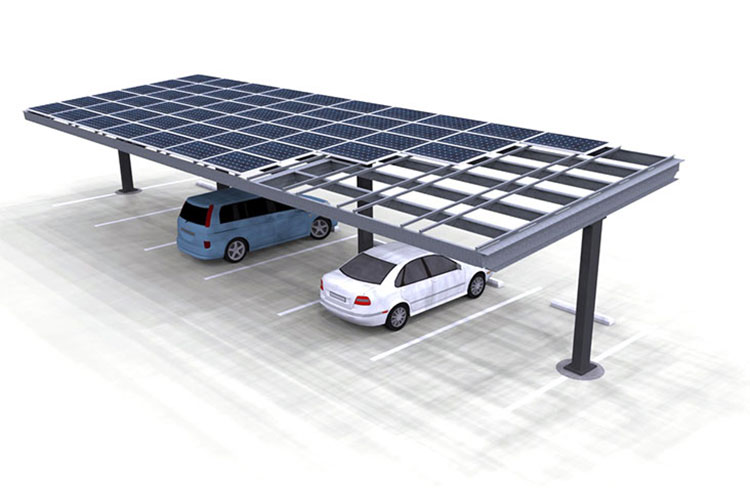

The park includes a covered parking area with a canopy made from photovoltaic panels and 120 electric vehicle charge points
August 18, 2023 | Staff Reporter | UK | Facilities Management

Northumberland County Council in the north of England has unveiled a solar car port array, which will help provide clean energy to the council’s headquarters at County Hall in Morpeth. Designed and built by UK Power Networks Services, the park includes a covered parking area with a canopy made from photovoltaic (PV) panels and 120 electric vehicle (EV) charge points.
The 40-year-old staff car park has undergone major refurbishment work, providing a timely opportunity for the council to upgrade its energy provision so that it is ready for the future. It is anticipated that the solar energy infrastructure will save between £100,000 and £150,000 on energy costs each year, which can be invested in council services. In addition, it is estimated that over 250 tonnes of carbon emissions will be saved each year assisting the council to meet its target of cutting its own emissions in half by 2025.
“This is a historical moment for Northumberland County Council and one we should be very proud of,” said councillor Glen Sanderson, council leader and cabinet member for climate change. “It’s great to see this initiative finally come to fruition which will save a massive amount on council energy supply spending and will also reduce the need for us to rely on fossil fuels to power our main building. I want to say a huge thank you to everyone involved in making this happen. It is a real example of using innovative technologies to move us towards a cleaner and more sustainable future.”
The new solar energy infrastructure is one of the largest car port array installations in the UK and features 800kW solar panels, while also providing weather protection for EVs. Additionally, there is a 400kW battery energy storage system with smart controls to optimise energy use, carbon emissions and costs throughout the day.
Energy from the solar panels will be used to power the main building, provide electricity to EV charge points for fleet and staff vehicles and also stored to help optimise costs and carbon efficiency.
The charging infrastructure includes 100 fast chargers and 20 rapid chargers, including some dedicated for accessible parking bays. This will make it easier for staff with EVs to charge their cars with no reduction in the number of staff parking spaces for combustion engine vehicles. Additional rapid charge and overnight charging options are also now in place for the council’s fleet vehicles.
“This solar energy infrastructure is one of the largest solar car port installations in the UK and will change the way the council’s fleet operate to reduce cost and improve carbon efficiency,” said David Mitchell, director of UK Power Networks Services.
The council plans to use this model to test the suitability of installing similar solutions in other public car parks in the county to reduce costs, meet carbon targets and also improve the resilience of energy supplies. The investment is part-funded by the England European Regional Development Fund as part of the European Structural and Investment Funds Growth Programme 2014-2020 with match-funding from the council, which it plans to recoup through energy savings.